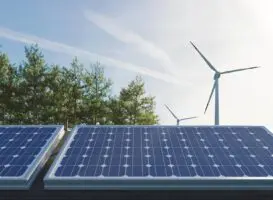Newcastle City Council says it has secured a $6.5 million loan from the Clean Energy Finance Corporation to help finance a 5MW solar farm to be built in the heart of one of Australia’s leading coal regions.
The $8 million solar farm, to be built by Lend Lease and Carnegie Clean Energy following a tender win announced last month, will begin construction in June and is expected to slash the council’s electricity bills, which had doubled in the last two years.
It will be built at the Summerhill Waste Management Centre – on a capped landfill site that was once part of the Wallsend Borehole Colliery – and is expected to save the city $9 million over the 30-year life of the plant.
The council’s electricity bill recently doubled to $4 million a year, thanks to soaring grid prices.
The Summerhill waste facility already features a 2.2MW landfill gas generator and a small wind turbine, and the council says this project will pave the way for future battery storage and electric garbage trucks.
Newcastle Lord Mayor Nuatali Nelmes said increasing its renewable energy capability and finding more energy-efficient solutions” is an integral part of our long-term vision to become a smart, liveable and sustainable city.”
“I’d like to thank the Clean Energy Finance Corporation for its incredible support of the City of Newcastle’s sustainability charter,” Nelmes said in a statement.
“We are building sustainability into everything we do after reiterating our commitment last year to generate 30 per cent of our electricity needs from low-carbon sources and cut overall electricity usage by 30 per cent by 2020.
CEFC CEO Ian Learmonth said it was exciting to see Newcastle transition to a “sustainable city of the future”, and noted the numerous towns and cities looking to do the same.
“Councils across Australia administer a vast network of streetlights, community centres, libraries, sport and recreation facilities and other public access buildings,” he said.
“Newcastle is leading the way in financing a solar farm through the CEFC to help it manage the energy costs of these facilities.
“We encourage other councils to also invest in clean energy, which can free up council finance for other community-enhancing projects while locking in longstanding environmental and economic benefits for their communities.”
A total of eight Newcastle City Council buildings host rooftop solar installations, including an art gallery, museum, works depot and libraries.








